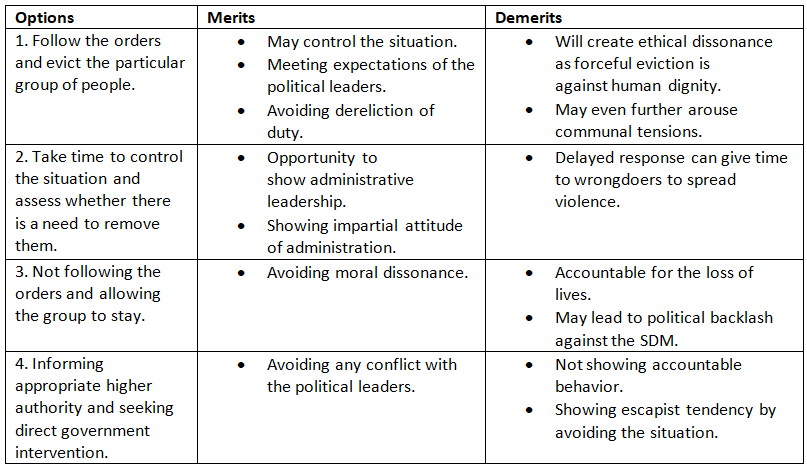Case Study: Duty Vs Morality | UPSC Mains: Ethics, Integrity & Aptitude PDF Download
Q: You are posted as an SDM in a division of district which is undergoing ethnic turbulence since sometime. There has been a substantial loss of lives and property due to the disturbance, following which you are given implicit orders by the ruling party of the area to move a certain section of population, belonging to a particular ethnic group, out of the area to control the situation. This order has put you in a difficult position as it goes against your own ethical values of targeting a section of population and moving them out of their homes. However, not following the orders will be taken as dereliction of duty and will put the onus on you for the loss of lives.
A. In this situation, what are the options available to you?
B. In your opinion, what can be the most appropriate course of action and why? (250 words)
Ans: Approach:
- Explain the given case and the ethical dilemma faced.
- Mention the options available with their merits and demerits.
- Mention a course of action with explanation.
The given case poses a challenge to choose between political orders of evicting a particular ethnic group against personal ethical values of targeting a section of population and moving them out of their homes. It highlights the ethical dilemma between duty ethics and social justice.
Options available

Option (2) appears to be the correct approach for handling the situation.
It is important to recognize that evicting a specific group may be perceived by the local population as targeting a particular community, potentially inciting violent actions from others. Additionally, the order could be politically driven without a rational basis. Complying with such an order would not only violate individual dignity but also contradict the ethical standards and code of conduct expected of civil servants.
Course of Action
As the SDM of the district, the following courses of action could be considered:
First, conduct a firsthand investigation into the ground reality and keep the political leadership informed about the seriousness of the situation. The primary focus should be on controlling the law and order situation and ensuring the safety and security of the people by:
- Increasing patrolling and deploying additional forces.
- Adopting a zero-tolerance policy against wrongdoers.
Additionally, persuade political leaders to allow time to manage the situation and emphasize that forced eviction of the group could worsen the conditions. Use social influence and persuasion by directly engaging with community leaders and seeking help from local influencers, grassroots workers, and NGOs to prevent ethnic clashes. Adopt an empathetic approach to gain their trust.
Once the situation is stabilized, long-term measures should be initiated to foster harmony among the groups and maintain strict vigilance to prevent any future triggers of conflict. Panchayat leaders should be encouraged to help maintain social harmony.
By working with political leaders and managing the law and order situation, the loss of lives and property can be prevented. This approach ensures the fulfillment of administrative duties while upholding social justice, demonstrating objectivity, and maintaining a non-partisan stance.
|
78 videos|95 docs
|
FAQs on Case Study: Duty Vs Morality - UPSC Mains: Ethics, Integrity & Aptitude
| 1. What is the difference between duty and morality in ethical decision-making? |  |
| 2. How can conflicts between duty and morality arise in public service? |  |
| 3. Why is it important for UPSC aspirants to understand the concept of duty vs morality? |  |
| 4. Can duty override morality in public administration? |  |
| 5. How can public administrators reconcile their duties with their moral beliefs? |  |


















